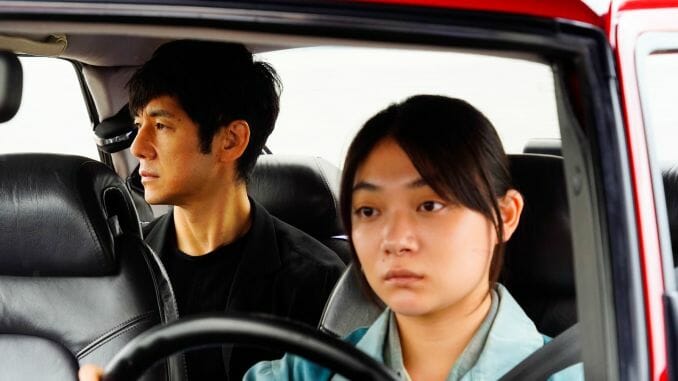Drive My Car Dazzles in Desolation

The melodic rotating faces of tire rims and cassette reels keep the time in Drive My Car, Japanese director Ryusuke Hamaguchi’s languorous adaptation of Haruki Murakami’s short story of the same name. The film’s meticulous commitment to unhurried emotional introspection might appear to be an overindulgence when considering its three-hour runtime, yet Hamaguchi and co-writer Takamasa Oe gracefully unfurl Murakami’s original story into a melancholy meditation of pain and performance that remains ever-enthralling.
Renowned theater actor-turned-director Kafuku (Hidetoshi Nishijima) and his screenwriter wife Oto (Reika Kirishima) have what seems like a perfect relationship. Apart from sharing considerable marital bliss, they stimulate each other intellectually and sexually—oftentimes simultaneously. Oto will regularly weave narrative webs aloud while mid-coitus with Kafuku, reaching climaxes in literal and figurative senses. Despite the mutual adoration, both harbor a damning secret: Oto sustains a string of lovers as she hops around on productions, while Kafuku silently uncovers his wife’s infidelity without confronting her. Both maintain the facade of a remarkably happy couple that have been together for over 20 years, yet internally struggle with the emotional toll of concealing the extramarital affairs. The situation is only brought to a head years later, after Oto sustains a mortal injury and Kafuku covertly recognizes one of Oto’s past lovers at an audition for his forthcoming multilingual production of Chekhov’s Uncle Vanya. Simultaneously consumed by jealousy and intrigue, Kafuku casts his wife’s much-younger former paramour Takatsuki (Masaki Okada) in the titular role.
The broader source material for Drive My Car is the Murakami-authored collection of short stories titled Men Without Women, each tale featuring a significant gendered dynamic or relationship. Though the complex yet invisible struggle between Kafuku and Oto appears to be the film’s foremost exploration, it’s the rapport that develops between Kafuku and Misaki Watari (Toko Miura)—a young woman hired to be his driver while he prepares his play for the stage in Hiroshima—which blooms into an unlikely friendship.
In the short story, Kafuku is apprehensive to hire a woman driver due to his sexist preconception of the entire gender’s lack of mechanical finesse. In Hamaguchi’s adaptation, Kafuku brandishes no such sentiment—his sole reservation concerns the preservation of his beloved red Saab 900 (with cassette player still intact), a vehicle perhaps made all the more precious due to fond memories of driving with his wife and poking fun at her poor form. Watari is a woman of few words, waiting in stark silence for Kafuku to complete his tasks in order to ferry him to his next destination. Yet while he admonishes his actors for their lackluster performances—going out of his way to give extensive notes to Takatsuki whenever possible—he gushes about his chauffeur’s expert driving. Kafuku’s approval eventually softens Watari’s brusque nature, and the two begin to share intimate details of their past traumas—exposing still-healing wounds in the process.
-

-

-

-

-

-

-

-

-

-

-

-

-

-

-

-

-

-

-

-

-

-

-

-

-

-

-

-

-

-

-

-

-

-

-

-

-

-

-

-








































